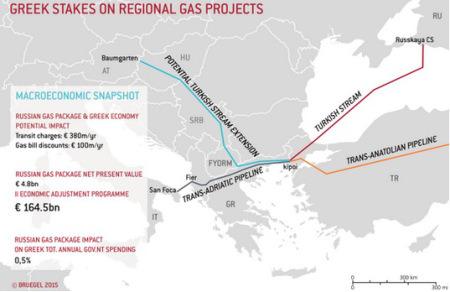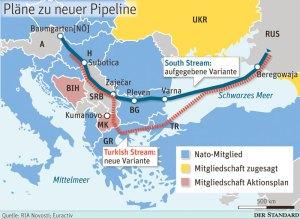 In my article Turkish, Greek And Tesla Streams Re-routing Energy Supply In Eastern Europe how new Turk(ish) Stream pipeline is re-routing the energy supply in whole Eastern Europe with Greek and Tesla [Balkan] Stream gas pipelines. South Stream, was cancelled last December (2014) after Bulgaria (influenced by the EU acting on behalf of the US) made it impossible to construct the pipeline through its territory. South Stream project was replaced with ‘Turkish Stream’, the Russian pipeline to Turkey’s Eastern Thrace region and from there with ‘Greek’, ‘Tesla’ (or ‘Balkan’) Streams intended to South Stream’s Serbian, Hungarian, and Austrian partners, but detouring through Greece and Macedonia to compensate for the exclusion of Bulgaria.
In my article Turkish, Greek And Tesla Streams Re-routing Energy Supply In Eastern Europe how new Turk(ish) Stream pipeline is re-routing the energy supply in whole Eastern Europe with Greek and Tesla [Balkan] Stream gas pipelines. South Stream, was cancelled last December (2014) after Bulgaria (influenced by the EU acting on behalf of the US) made it impossible to construct the pipeline through its territory. South Stream project was replaced with ‘Turkish Stream’, the Russian pipeline to Turkey’s Eastern Thrace region and from there with ‘Greek’, ‘Tesla’ (or ‘Balkan’) Streams intended to South Stream’s Serbian, Hungarian, and Austrian partners, but detouring through Greece and Macedonia to compensate for the exclusion of Bulgaria.
At the same time, several observers say that South Stream has a good chance of being revived. Since there’s been no official cancellation of the South Stream cooperation from Moscow, Bulgaria assumes that the project can still be saved. Speculation about a revival appears to have come from a source in Moscow. Russia needs the pipelines as a tool to assert political pressure. And Bulgaria could play a role in these plans. (Source: DW ).
European nations could buy gas from a terminal at the Greco-Turkish border, in what was interpreted as a vague hint that such purchases could either be LNG or possibly even the start of a brand new pipeline. Anyway with these plans Turk(ish) Stream and its follow-ups are according EU regulations. The obstacle of South Stream was the EU’s Third Energy Package (TEP). Under these rules, a single company cannot own the pipeline through which it also supplies gas.
Comeback of South Stream
Now though, according Deutsche Welle there’s a different tone between Moscow and Sofia. Earlier this week, Putin acknowledged that Bulgaria’s NATO membership is a done deal. “We have to respect the choice of the Bulgarian people and continue to work with Bulgaria, independently of all the difficult questions in connection with different projects, including South Stream,” he said. Putin added that Russia and Bulgaria have historically enjoyed close ties. In Bulgaria, his words have been taken as a “clear signal of reconciliation” and “a completely new tone in bilateral relations.”
According Natural Gas Europe Bulgarian Energy Minister Temenuzhka Petkova has announced new efforts to push forward with South Stream, recently telling local media the project still remains a major goal for the country. She also said that the country’s has never walked out of the South Stream project. Kiril Domuschiev, head of the Confederation of Employers and Industrialists in Bulgaria, noted that pipework for South Stream could also be used for Turkish Stream or any other project involving both Bulgaria and Gazprom. He added that no one would stop Bulgaria from doing business with Russia.
No other country lying on the proposed route of the pipeline from Russia to central Europe is better prepared than Bulgaria in technical and organizational terms to start the construction works immediately, said Bulgaria’s former Energy Minister Dragomir Stoynev who is deputy chairman of opposition Bulgarian Socialist Party (BSP). Another big advantage for Bulgaria is the availability of an agreed funding mechanism for the project which doesn’t involve budget spending and only needs to be activated, Stoynev said in comments after Putin’s earlier statement that Moscow will work closely with Bulgaria on the implementation of joint projects including those in the energy sector such as the South Stream gas pipeline. (Source: Novinite.com )
Energy expert Professor Atanas Tasev said in an interview for FOCUS News Agency , that “Both countries [Bulgaria, Russia] seem to have the intention. It remains Brussels to come out with a stance on the matter. Perhaps we will witness favourable processes in resolving the conflict in Ukraine,” “Many steps should follow from now on,” he added and stressed that the first official reaction from the Bulgaria came from Energy Minister Temenuzhka Petkova, who said that our country is ready.
“A problem can be solved only in the environment where it was created. Since it was the Russian President who created the problem, it is he who can solve it,” Prof Tasev, who has worked as a financial analyst for a number of deals in the Bulgarian energy sector, believes. He maintains that the route previously designated for South Stream is not “a result of some sentiments for the Bulgarian-Soviet fellowship” but is the most economically and technically viable solution. At the same time the professor notes that it is highly unlikely that South Stream is “reborn” with all of the four lines. He foresees that one of the pipes, with a capacity of 15.75 billion cubic meters of gas, might reach Europe via Turkey, while the others could be “redirected” to Bulgaria. (Source and more at Novinite.com )
Nine months after Russia loudly announced that it repeals the South Stream project, the Bulgarian government continues to carry out activities on construction of the pipeline. In addition the joint Bulgarian-Russian company South Stream Bulgaria, which had to build the pipeline on Bulgarian territory, continues to exist and accumulate costs. (Source: Radio Bulgaria )
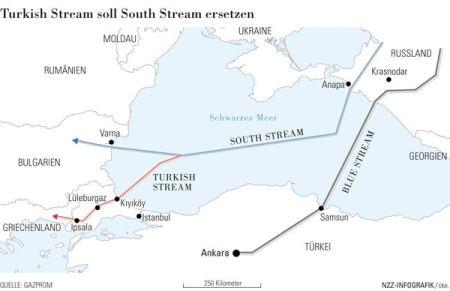
Nonetheless Greece, FYROM, Serbia, and Hungary are on the verge of signing a joint memorandum of cooperation on Turkish Stream and its Balkan route. Serbian media have already named part of the route as the “Tesla Pipeline” in an obvious attempt to “nationalize” the section that will pass through Serbia. Insiders suggest the Greek, Serbian, and Hungarian foreign ministers will meet in Belgrade in September to announce an agreement that will see the exact route formalized. It should be noted the foreign ministers, not energy ministers, have taken the lead on this file. (Source: Natural Gas Europe ) Latest developments with Tesla Stream wouldn’t have been possible had Macedonia not beaten back the Color Revolution attempt that aimed to sabotage the entire thing. (More in Terrorism in Macedonia Wasn’t An Isolated Act! ).
Eastring?
For Eastern Europe there is also a project called Eastring will bring gas from Azerbaijan, Turkmenistan, Iraq, Cyprus and Russia and will provide reverse deliveries from the gas hubs in Western Europe. This is actually a step towards the creation of a vertical gas corridor which is particularly valuable to Bulgaria.
Eastring would connect infrastructure in Slovakia to Romania and Bulgaria. Slovakia has taken the lead on the project and even suggested connecting to Turk Stream. Bratislava wants to be part of Gazprom’s plans to diversify transit options away from Ukraine because Slovakia is the critical link between pipelines in Ukraine and central Europe. The Slovakian company Eustream’s gas pipeline, expected to deliver gas to countries in the Balkans, and Gazprom’s Turkish Stream will be complementary projects, Eustream’s international development and public affairs head told RIA Novosti [on Feb. 2015]. Eustream’s Eastring pipeline will run from Bulgaria to Romania and then, via Hungary or Ukraine, to Slovakia. Its planned capacity will be from 20 billion to 40 billion cubic meters per year and project partners are Eustream, Transgaz and Bulgartransgaz.
Wider picture
Aside from production, the transportation of crude oil, natural gas and petroleum products is of paramount concern for oil-producing nations. For energy consumers, transit routes are necessary lifelines. A huge amount of the world’s energy is transited through pipelines, across the Eurasian landmass in particular. Natural gas has limited and expensive transport options. As a result, natural gas pipelines are constantly used as tool of the political pressure and bargaining. One of the most notable battlefields is the European continent, where Russia has exerted its influence through an intricate network of pipelines.
There is a strategic cooperation in the energy sector between EU and Russia as Russia is still the primary supplier of the EU’s hydrocarbon resources, providing 42% of its imported gas and 33% of its imported oil (2013). In addition due global warming the EU want to increase the share of renewable resources and natural gas in their consumption patterns. Russia’s bad relations with the West and Ukraine have created the need to Russia to rearrange its energy policy. From the Russia’s point of view Turkey, as a regional power with its independent policies, e.g. when deciding not to partake in the Western sanctions against Russia due to the Ukraine Crisis, is a more reliable partner than other alternatives. Cooperation between these two regional powers on issues related to Caucasia and Central Asia would generate mutual benefits so indeed the Ukraine Crisis may have paved the way for a new form of cooperation in Russian-Turkish relations.
The Continent has also taken steps to build a regulatory environment conducive to the new energy market it envisions. The Third Energy Package has played a key role in coordinating the European energy market and eroding monopolistic tendencies plaguing the natural gas networks. Among other things, the package’s regulations prevent pipeline operators from supplying natural gas and prevent suppliers from operating the pipelines. These rules have blocked Gazprom from owning or heavily investing in any European pipelines, with a few notable exceptions, such as the Ostsee-Pipeline-Anbindungsleitung pipeline. Europe has applied equal scrutiny to deals involving non-Russian companies, including Azerbaijani national oil company SOCAR’s proposed purchase of Greek pipeline operator DESFA.
Interactive: Veins of Influence
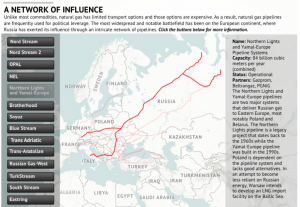
“Interactive: Veins of Influence is republished with permission of Stratfor.”
Turk Stream update
The Gapzrom-led Turk(ish) Stream pipeline project has stalled as negotiations between Russia and Turkey on gas pricing have broken down. On July 2015 the Russian Energy Ministry sent to Ankara two versions of an intergovernmental agreement on the Turkish Stream gas pipeline, proposing to construct either one or all four planned strings.
The technical director of South Stream Transport B.V. Andrey Fick has been appointed as general director of the company in charge of construction of the Russia-owned Turkish Stream gas pipeline, Russian energy giant Gazprom announced in its statement, April 2015.
Related to The Environmental Impact Assessment (EIA), the Project benefits from the data available from the extensive surveying and approved EIA, and Environmental and Social Impact Assessment (ESIA) in accordance with international financing standards, conducted for the South Stream Offshore Pipeline project. The EIA and permitting process for the Turkish portion of the offshore pipeline is divided into two parts. South Stream Transport is conducting an EIA for the portion of the pipeline from the border of the Turkish and Bulgarian Exclusive Economic Zone (EEZ) to the Turkish coastline, with a length of approximately 275 km. For the remainder of the offshore route, the EIA was already approved in 2014 in the context of the South Stream Offshore Project.
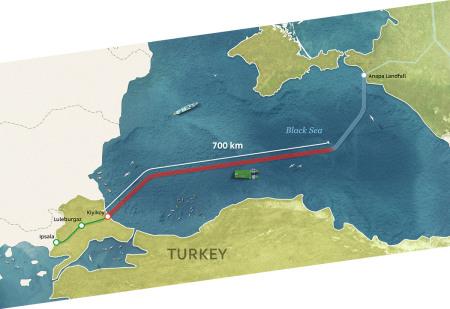
Bottom line
Gazprom has asserted several times that it will cut off gas transits through Ukraine by the end of the decade. The current alternative routes (Nord Stream + Belarus), however, only present a capacity of 86.5 bcm per year. To maintain the current level of Russia’s exports (119 bcm in 2014) at least 35 bcm of additional pipeline capacity would be needed.
Turk Stream as well South Stream, would enhance the Continent’s energy security because it would enable natural gas flows to Europe to continue uninterrupted in the event of a fallout between Ukraine and Russia. The pipeline project would also incentivize European Union-based companies to invest in infrastructure in Southeastern Europe, integrating countries such as Romania and Bulgaria, into the more mature natural gas markets in Central Europe. New infrastructure for Turk Stream could also eventually carry Iranian or Central Asian natural gas to Europe. Due political reasons USA and EU probably are not very pleased nor active with Turk Stream, they maybe are tolerating the project so long as Russia adheres to the Third Energy Package and finalized Energy Union Package rules restricting Russian control over the Turk Stream project.
